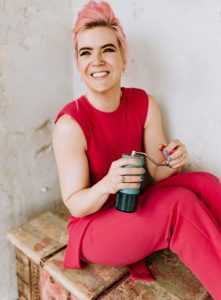MILAN – Wendelien van Bunnik is the 2019 World AeroPress Champion, a SCA certified trainer, the Dutch barista champion in 2019 and the founder of The Happy Coffee Network, working in this sector and loving it since 2009. Her professional perspective is one of sharing, fun and love of coffee: here is her story.
Wendelien van Bunnik , when did you decide that this method of extraction was your favorite and why?
“I always liked the Aeropress, because it was the brewing method that I could control better and reproduce the recipe. In my experience, it’s easiest to replicate it. I have always had that feeling from the first moment I learned about the AeroPress method. With the others pour over I felt that the flow range was a lot more inconsistent and with those methods of percolation, the human factor is a lot bigger than with AeroPress which is so much more forgiving in terms of flavors for baristas. It’s hard to mess up. If you bring your AreoPress on holidays, you have a major chance of making a good cup of coffee. It’s very convenient also for cleaning. Of course, from the consumer side, it’s really difficult to make a bad cup of coffee with AeroPress.”
Wendelien van Bunnik, what is your recipe for a perfect extraction?
“I don’t think that it could exist something like perfection. What makes AeroPress my favourite, it’s that is super fun to play around. If I had to choose I would always prefer to use a very lighter roasted coffee, more fruity, like Ethiopians, or Kenyans, with some high sweetness. I would stick to easy recipes like 60 grams of coffee, 250 grams of water. It’s just very easy to reproduce and to remember.”
In the years from when you approached AeroPress to now, has this extraction method become more popular?
“AeroPress has been pretty stable in popularity. From 2008 its launch it took off. When I started working as a barista I got in 2011 my first Aeropress and I knew that was a concept that many coffee people took in their travels for brewing in their hotel rooms and camping. It was very constant in its popularity and also the championships of Aeropress are growing up: it started from literally three guys competing to over 60 countries having their national championship. The overall feeling of Aeropress has never changed: it has always been this fun kind of corky method that baristas love.
In terms of workflow, I can see why the coffee shops could be problematic: in coffee shops the problem with brewing filter coffee in cafès. Is a one-time flow routine, it takes a lot of time for a barista to make only one. You can pull a lot of espresso shots for cappuccino and lattes in the time that it takes to extract two pour-overs. Also with a pour over you have to make a lot of attention to many details. This is why I would argue in favor of AeroPress because it’s quicker than pour-over, but of course, you can only press
one at a time. So I can understand why it makes sense to brew pour over because you ca ne make 3 at a time and catch up with the workflow. There are pros and cons for both.”
Is it true that it might be more appealing to an Italian consumer because it is a compromise between the body of an espresso and that of a V60?
Wendelien van Bunnik: “I think that AeroPress, a hybrid method between full immersion like French Press and percolation like the V60, is an ultimate compromise: you have the structure and cleanness that you could have with a paper filter, but you also have the option to increase the body and the sweetness, because you can let extract it longer. It’s easier to get more mouth feel in the coffee from the AeroPress than the one you could obtain with other pour-overs.”
Have you tried the AeroPress Clear yet? How do you find it? Does the Tritan material make any difference?
“It looks really nice, the clear material reminds me of the first generation and that’s very smart. It looks gorgeous and it works very well, the material feels very hard. You can also see exactly where you’re making mistakes, where the coffee is not fully saturated. It gives you more feedback to make a good cup of coffee.
It’s very fun to see your coffee brewing if you’re a coffee nerd. But in the end, there are no differences between other Aeropress. It’s kind of sad that is not very affordable like the first Aeropress, it’s becoming more expensive and it’s losing its first democratic nature.”
Wendelien van Bunnik, from the height of your experience and expertise, what would you say to those who have yet to try an AeroPress to convince them to give it a try?
“I would say that if the pour-over coffee – if you try it and you don’t like it because it was too light, too citric, you miss a stronger body and more intense flavors – then you can give AreoPress a go. You have a clean flavor because you don’t have fines, but you can just extract that for longer and you can make it as strong as you like. It’s a fun thing to brew, with the flipping and the plunging it’s important: it’s ok to know what we’re doing seriously, but, in the end, the goal it’s to brew a good cup of coffee and having some fun in the process.”
A curiosity: how many AeroPress do you have?

“I think that at the moment, I have 9-10 AeroPress. There’s the two tropheys, a mermaid customed AeroPress from an artist of Australia, I have a second generation Aeropress and I’m looking for getting a first generation one. I have the new one in Tritan. – Wendelien van Bunnik tells – I’m a collector: I have even a pink one, of course.”
Are you willing to compete again?
“Not in AeroPress, I have the chance to be a judge and it brings me so much joy to see communities in all the countries that are evolving around Aeropress. It really connects the coffee community. It’s fun to see as a judge, a guess, or an MC, and also, I’m not so great at losing: it’s important to let other people be able to have the same opportunity. I have already taken the highest price.
About the other championships: I would never compete in latte art because I don’t have the patience for it. I met Carmen and Manuela last year and we chat for a couple of minutes: she was very inspiring but I realized that I don’t have the patience for training like that. I do like competing as baristas and probably I will compete again because I love the part of the performance. I like competition for the things that you learn from the experience.”
Wendelien van Bunnik , what about the balance between personal life and professional life?
“I think that we all are looking for some balance between the two and I think that it shouldn’t be harder for women to get it, but it is. It’s something that every family has to find. I’m very lucky that my husband is very engaged and excited about my journey. When I started competing, even if he was not in the coffee sector too, he was very supportive. My daughter (we have a 6 year old daughter) knows that I’m doing what I love and it’s important that she has that as a model. I don’t try to be perfect and it’s ok. She definitely helps me to plug down the AeroPress.”
To conclude, Wendelien van Bunnik tells us about the latest project he is recently pursuing: thehappycoffeenetwork

“The happy coffee network is my passion project. I want to connect people to each other. If I can introduce people to each other they can feel better about themselves. Through the years I could create a big network myself during the events and great shows but I’m a very extrovert person. There are a lot of people out there that would like to be a part of the community but they’re just shy.
I want to connect with them to make them feel less alone, and more confident and make them push themselves as coffee professionals. I decided to build my coffee network to make people happy about themselves in an industry that can be very overwhelming and it could be difficult to find your place in it. In the Happycoffeenetwork it’s ok to ask any questions, to have fun, and to share doubts and mistakes and tips. That’s the idea behind it. Practically it means that I created the website and also an app to use on a mobile phone.
I’ve been launching it with a paid membership where can sign (10 euros a month): we have kind of 160 members from 23 different countries and it’s still growing. The next year I’m going to share more value with people that are not necessarily members yet, through online meetings, the Zoom (brewing rooms) where we have a cup of coffee together and we can talk about anything, also mental health and burnout. There’s a group called “Celebrate your victories” and you can post about the moment when you have something you feel great about and you can get so much support. Giving people knowledge helps to increase their self-esteem.
It starts giving them access to knowledge. It is mostly what I do as a coffee trainer: the ultimate goal is to get people the opportunity to learn from others and then to share their knowledge as well. It’s to make people more brave. I know that people and members that are joining every day are united in this mission. It’s a place of positivity. We have many new ideas to improve like the courses, and a podcast: that’s very fun for me as well. We have many kinds of members: from coffee-lovers to trainers, from professional baristas to roasters. It’s very interesting for everyone in the coffee industry.”


















